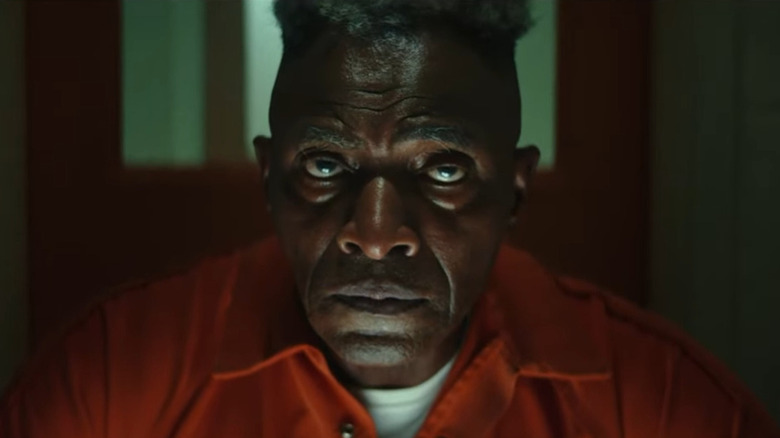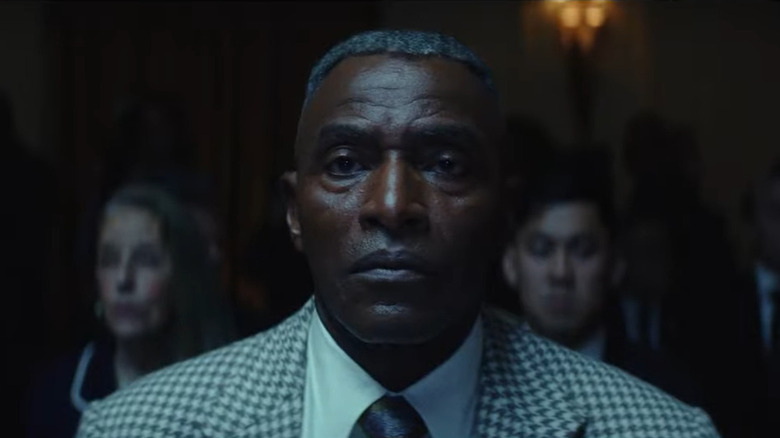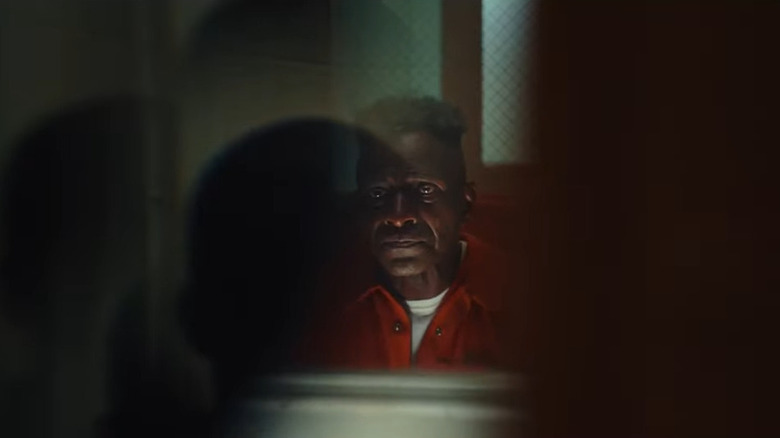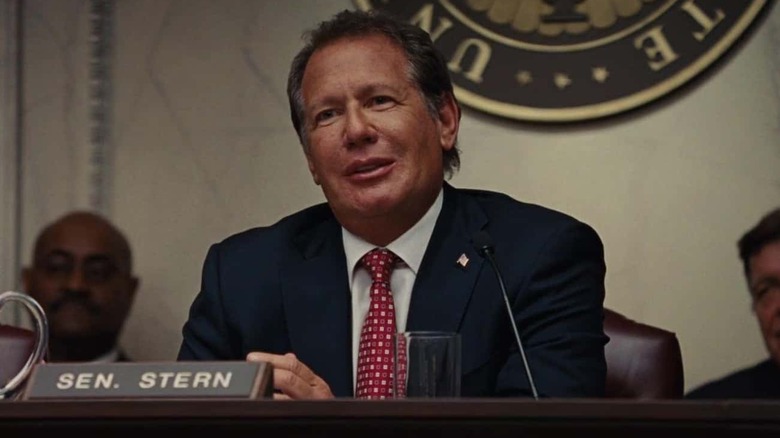How Marvel's Captain America: Brave New World Betrays Isaiah Bradley
This article contains mild spoilers for "Captain America: Brave New World."
How would Captain America vote?
It's immensely frustrating how apolitical the Marvel Cinematic Universe tends to be. Too many of their films boil down to simple tales of "good vs. evil," or stories of bad parentage. Most of them also contain ideas exploring the function of blood vengeance (committed by both heroes and villains), or are, for the most part, about the positive power of teamwork. When it comes to explicitly stated political points of view, though, the MCU tends to affect an aggravating hands-off approach.
This is especially galling when one of your franchise's most popular characters is an American soldier named Captain America who wears an American flag as his uniform. One might think that he, of all people, would have a point of view about the U.S.A. The most audiences have ever seen about Cap's politics was when Steve Rogers (Chris Evans) opposed the signing of the Sokovia Accords that would create an oversight body to keep tabs on America's resident super-beings. It seems that Steve didn't like regulation and supported small government. Perhaps he was a Republican.
The apolitical nature of Captain America reaches a brazen degree in Julius Onah's new film, "Captain America: Brave New World." The film stars the new Captain America, Sam Wilson (Anthony Mackie), a heroic but demure fellow who seemingly wants to play nice with the new President, Thaddeus Ross (Harrison Ford). However, his support of the President is utterly baffling when one considers that Sam is friends with a character named Isaiah Bradley (Carl Lumbley).
The Bradley character was first introduced to the MCU in "The Falcon and the Winter Soldier," and his backstory is complex and horrifying. He has every reason to hate the American status quo, and his suffering was the direct result of America's institutionalized racism. Onah's film tragically doesn't let Bradley be outraged at his own mistreatment. Instead, Bradley is encouraged to perpetuate the status quo. The MCU may be apolitical, but it's hard to stay that way when you're staring politics right in the face.
Isaiah Bradley was imprisoned and tortured by America
Bradley, as it's briefly explained in "Brave New World," was, many decades before, a recipient of the same Super Soldier Serum that gave the original Captain America his powers. He is still super-strong and is seen early in the film swinging a full-size punching bag like a baseball bat. Bradley also mentions that the Serum was used as an experiment on him and that the U.S. government didn't like the idea of a Black man being that powerful, forcing them to imprison him for reasons of racism. While serving an undeserved 30-year sentence, Bradley was subjected to horrid, unspecified medical experiments.
The notion that a Black man was the subject of wartime medical experiments calls to mind the Tuskegee Syphilis Study. From the 1930s all the way through the early 1970s, the U.S. government oversaw a real-life medical study wherein they infected hundreds of Black men with syphilis without their knowledge, hoping to trace the long-term effects of the untreated disease. Over 100 men died. The subjects were told they would take part in a 6-month medical study, but the study was extended to 40 years.
Sam Wilson, another Black man, doesn't bring up the racial injustice of Bradley's story, leaving a large political hole in "Captain America: Brave New World." Indeed, when Bradley is invited to the White House for one of President Ross' press events, he gladly accepts, happy to be wearing an old suit again. It seems that decades of racial injustice are supposed to be lightly ignored, just so Sam, Bradley, and the new Falcon (Danny Ramirez) can laugh together.
The first plot point of the movie is when Bradley, operating under an eerie mind-control device, tries to shoot the president. One could be forgiven for thinking that Bradley tried to shoot the president of his own accord. He certainly had every reason to hate America and the callow presidents that lead it.
Brave New World doesn't give offer Bradley any justice
After the assassination attempt, Bradley is thrown back into prison, a fate that fills him with panicked despair. He knows that living in prison will destroy him, both mentally and physically. The fact that he was placed there after another experiment only made the incarceration worse. "Brave New World" hinges on the inequity involved in incarcerating a Black man, after already acknowledging that locking up Black men is one of America's greatest injustices.
But "Brave New World" doesn't move forward with that injustice. Sam Wilson, one might think, would express some sense of righteousness over seeing his friend in prison. Does he mention to the President or anyone else that Bradley was harmed by America's racist policies of the past? Does he point out that America has notoriously mistreated its Black citizens, and feels a need to fight against the systems that still seem designed to wrongfully imprison people? No, Sam does nothing of the sort. Indeed, the makers of "Brave New World" go well out of their way to remain apolitical throughout. Sam is a fighter of superhero battles, and that's all he is.
Indeed, Sam continues to serve the American military, fighting to uphold the system the way it is. There are no efforts to — or even a mention of — racial justice for Isaiah, save for a few internal conflicts Sam hints at having regarding his positionality, but never takes the time to interrogate what caused them. Isaiah just has to languish in prison, waiting to be freed. Then, once out, be immediately forgiving and lighthearted about the matter. Ho ho, sorry fellas. We all make mistakes. Who hasn't systematically oppressed a minority of its citizens for centuries? Ho ho.
These types of narrative gaps are already attractive negative reactions.
The U.S. Government in the MCU is peerless and pure, and that's a problem
The "Captain America" movies have a distressing tendency to present the American government as peerless and pure, seemingly incapable of committing acts of injustice. Although set in the 1940s, Joe Johnston's "Captain America: The First Avenger" ignores any whiffs of racism. Anthony and Joe Russo's "Captain America: The Winter Soldier," however, is a prime offender in this regard. In that film, it is stated that a secret cabal of evil super-Nazis — Hydra — infiltrated the government long ago, and it was their active villainy that was responsible for all of America's bad decisions made since the 1940s. The Government was innocent. It was the Nazis that are to blame.
Here in 2025, as America enters a sad phase of near-authoritarian rule, maybe "The Winter Soldier" would have been wiser to state that the Nazis in the government were not being secretive, and merely the result of racist, ignorant thinking and fearmongering politics. "The Winter Soldier" would have been stronger if Cap found that he had to fight against his own government to restore its lost ideals. Instead, he can rid the Government of Nazis, and the problem will be solved, keeping the U.S. pure and blameless.
Even if you disagree with the Sokovia accords as they were presented in "Civil War," you might see that it was presented as a singular and draconian effort by Thaddeus Ross (William Hurt) to control heroes. The Avengers never had to fight against the tide of popular opinion or acknowledge that the whole government may not like them. No, the U.S. is on their side.
And now we have "Brave New World," another film wherein the government is forgiven of all malfeasance. And they're able to get away with it because it's stated victims were casually able to forgive. No reparations, no contrition. In "Brave New World," it's the victim's job to just get over it. Isaiah Bradley deserved more.



